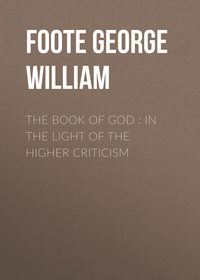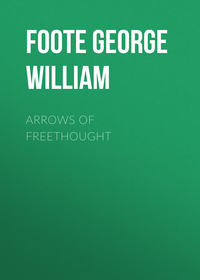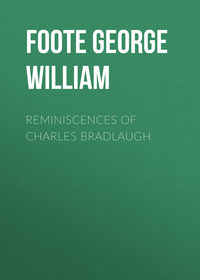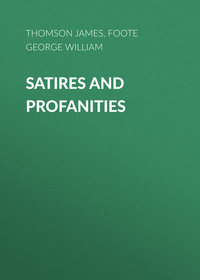 полная версия
полная версияFlowers of Freethought (First Series)
Similarly the enthusiasm of the first followers of Jesus, and especially of hysterical ladies like Mary Magdalene, refused to believe that he was dead. The fable of his resurrection was gradually developed, and his ascension was devised to round off the story. Whoever will read St. Paul's epistles first, and the Gospels and the Acts afterwards, will see how the Christ myth grew from vagueness to precision under the shaping imagination of the Church of the first century after the age of the Apostles.
It is a significant fact that the appearances of Jesus after his Resurrection were all made to the faithful, and his ascension took place before them, without a single impartial person being allowed to witness an event of which it was of the utmost importance for the world to have positive assurance.
When we turn to the Gospels and the Acts, five documents whose authorship is absolutely unknown, we find the most contradictory accounts of what happened after the Resurrection. It may safely be affirmed that five such witnesses would damn any case in a legal court where the laws of evidence are respected.
These witnesses cannot even agree as to whether the risen Jesus was a man or a ghost. Now he comes through a closed door, and anon he eats broiled fish and honeycomb; now he vanishes, after walking and talking with his disciples, and anon he allows the sceptical Thomas to examine the wounds of his crucifixion as a proof that he was not a spirit, but solid flesh and blood.
According to Matthew's account, Jesus first appeared to the women – as is very probable! Mark says his first appearance was to Mary Magdalene alone; Luke says it was two of the disciples on the road to Emmaus.
His subsequent appearances are recorded with the same harmony. While Matthew makes him appear but once, Mark makes him appear three times – to the women, to the two disciples going to Emmaus, and to the eleven apostles. Luke makes him appear but twice, and John four times – to Mary Magdalene alone, to the disciples in a room without Thomas, to the same again with Thomas, and to the same once more at Tiberias. John is the only one who tells the pretty story about Thomas, and John of course is the only one who mentions the spear-thrust in Christ's side at the crucifixion, because he wanted a hole for Thomas to put his hand into, and the other evangelists had no need of such a provision. Matthew and Mark relate that the disciples were told by an angel to go to Galilee, while Luke keeps them in the Holy City, and Acts declares that Jesus expressly "commanded them that they should not depart from Jerusalem."
The ascension itself, which involved the last appearance of Jesus, as well as his disappearance, is not related by Matthew, nor is it related by John. Now Matthew and John are supposed to have been apostles. If the ascension happened they must have witnessed it; but both of them are silent, and the story of the ascension comes from three writers who were not present.
Nor do these three writers agree with each other. Luke informs us that Jesus ascended from Bethany, a short distance from Jerusalem, on the very day of the Resurrection, or at the latest the next morning; while Mark, without any precision as to time, distinctly affirms that Jesus ascended from Galilee, which was at least sixty miles from Jerusalem. Now the ascension could not have occurred at two different places, and, in the absence of corroborative testimony, Mark and Luke destroy each other as witnesses. The author of Acts agrees with Mark as to the place, but differs both from Mark and Luke as to the time. He declares that Jesus spent forty days (off and on) with his disciples before levitating. This constitutes another difficulty. Mark, Luke, and the author of Acts must all leave the court in disgrace, for it is too late for them to patch up a more harmonious story.
According to the detailed account in Acts, Jesus ascended in the presence of his apostles, including Matthew and John, who appear to have mistrusted their eyesight. After making a speech he was "taken up, and a cloud received him out of their sight." He was in a cloud, and they were in a cloud, and the millions who believe them are in a cloud.
The time of the year is seasonable for an examination of the story of the Ascension. Would that the opportunity were taken by Christians, who believe what they have been taught with scarcely a moment's investigation, and read the Bible as lazily as they smoke their pipes. We do not ask them to take our word for anything. Let them examine for themselves. If they will do this, we have no fear as to the result. A belief in the New Testament story of the supernatural Christ is impossible to any man who candidly sifts and honestly weighs the evidence.
If Christians would pursue their investigations still further they would soon satisfy themselves that the life, death, resurrection, and ascension of Jesus Christ are largely, if not entirely, mythical. Now, for instance, when they are preparing to celebrate the ascension of Christ, they are welcoming the ascension of the Sun. The great luminary is (apparently) rising higher and higher in the heaven, shedding his warmer beams on the earth, and gladdening the hearts of man. And there is more connection between the Son and the Sun than ordinary Christians imagine.
THE RISING SON
You are requested to read the above title carefully. Notice the spelling of the last word. It is son, not sun. The difference to the eye is only in one letter. The substantial difference is very great. Yet in the end the distinction between the Son and the Sun vanishes. Originally they were one and the same thing, and they will be so again when Christianity is properly understood.
Supposing that Jesus of Nazareth ever lived, it is impossible to know, with any approach to accuracy, what he really was. With the exception of four epistles by Saint Paul – in which we find a highly mystical Christ, and not a portrait or even a sketch of an actual man – we have no materials for a biography of Jesus written within a hundred years of his death. Undoubtedly some documents existed before the Canonical and Apocryphal Gospels, but they were lost through neglect or suppression, and what we have is simply the concoction of older materials by an unscrupulous Church.
During the interval between the real or supposed death of Jesus and the date of the gospels, there was plenty of time for the accumulation of any quantity of mythology. The east was full of such material, only waiting, after the destruction of the old national religions under the sway of Rome, to be woven into the texture of a non-national system as wide as the limits of the Empire.
Protestants are able to recognise a vast deal of Paganism in the teaching and ritual of the Roman Catholic Church. On that side they keep an open eye. On the other side their eye is shut. If they opened it they would see plenty of Paganism in the gospels.
The only fixed date in the career of Jesus is his birthday. This is known by every scholar to be fictitious. The primitive Church was ignorant of the day on which Jesus was born. But what was unknown to the apostles, one of whom is said to have been his very brother, was opportunely discovered by the Church three hundred years afterwards. For some time the nativity of Jesus had been celebrated on all sorts of days, but the Church brought about uniformity by establishing the twenty-fifth of December. This was the Pagan festival of the nativity of the Sun. The Church simply appropriated it, in order to bring over the Pagan population by a change of doctrine without a change or rites and customs.
It may be objected that the primitive Church did not inquire as to the birthday of Jesus until it was too late to ascertain it. But this objection cannot possibly apply to the resurrection, the date of which is involved in equal uncertainty, although one would expect it to be precisely known and regularly commemorated. For many ages the celebration was irregular. Different Sundays were kept, and sometimes other days, in various weeks of March and April. Finally, after fierce disputes and excommunications, the present system was imposed upon the whole Catholic world.
Easter is, in fact, decided astronomically, by a process in which sun-worship and moon-worship are both conciliated. The starting point is the vernal equinox, which was the time of a common Pagan festival. The very name of Easter is of heathen origin. All its customs are bequeathed to us from far-off Pagan ancestors. Easter eggs, symbolising the life of the universe, have been traced back to the Romans, Greeks, Persians, and Egyptians.
When the Christians celebrate the resurrection of Christ they are imitating the ancient "heathen," who at the same time of the year commemorated the resurrection of the Sun, and his manifest triumph over the powers of darkness. And when the moderns prepare to celebrate the ascension of Christ, they are really welcoming the ascension of the Sun. The great luminary – father of light and lord of life – is then (apparently) rising higher and higher in heaven, shedding his warmer beams on the earth, and gladdening the hearts of men.
Churches and altars are decked with vegetation, which is another relic of nature-worship. Life is once more bursting forth under the kindling rays of the sun. Hope springs afresh in the heart of man. His fancy sees the pastures covered with flocks and herds, the corn waving in the breeze, and the grapes plumping in the golden sunshine, big with the blood of earth and the fire of heaven.
According to the Apostles' Creed, Jesus descended into hell between his death and resurrection. That is also a relic of sun-worship. During the dark, cold winter the sun descended into the underworld, which is the real meaning of Hades. Misunderstanding this circumstance, or deliberately perverting it, the early Church fabricated the monstrous fable that Jesus "preached unto the spirits in prison," as we read in the first epistle of Peter. One of the apocryphal gospels gives a lively account of how he harried the realm of Old Harry, emptying the place wholesale, and robbing the poor Devil of all his illustrious subjects, from Adam to John the Baptist.
A volume might be filled with illustrations of the mythology of the Resurrection. Our present space is limited, and we must let the above suffice. Anyone who reads the gospel story of the resurrection and ascension of Jesus Christ, with a careful eye and a critical mind, will see that it is not historical. Such witnesses, so loose in statement and so contradictory of each other, would collapse in a few minutes in any court of law. They do not write as spectators, and they were not spectators. What they give us is the legendary and mythical story that had taken possession of the Christian mind long after all the contemporaries of Jesus were dead.
Our belief, in conclusion, is that the Rising Sun will outlast the Rising Son. The latter is gradually, but very surely, perishing. Even professed Christians are giving up the miraculous elements of the gospels. But who would give up the Sun, which has warmed, lighted, and fertilised the earth for millions of years, and will do so for millions of years after the death of Christianity?
ST. PAUL'S VERACITY
A very pretty storm has been raised (and settled) by the Independent and Nonconformist. It raged around the Apostle Paul and Mr. Herbert Spencer, who both come out of it apparently not a penny the worse. Mr. Spencer has a chapter on Veracity in his recently published Principles of Ethics, wherein he cites Paul as a violator of this virtue, and remarks that "apparently piquing himself on his craft and guile," he "elsewhere defends his acts by contending that 'the truth of God hath more abounded through my lie unto his glory.'" This roused the ire of the Independent, and Mr. Spencer was informed that his extraordinary aspersion on the Apostle's character was wholly without justification. Whereupon the great Evolutionist replied that two days before receiving the Independent he had "sent to the printer the copy of a cancel to be substituted for the page in which there occurs the error you point out." Mr. Spencer goes on to say that he had trusted to assistants, and been misled on this particular point as on a few others.
"The inductions contained in the Principles of Sociology and in Part II. of the Principles of Ethics are based mainly, though not wholly, upon the classified materials contained in The Descriptive Sociology, compiled between 1867 and 1881 by three University men I engaged for the purpose. When using this compilation of facts concerning sixty-eight different societies I have habitually trusted to the compilers. For even had I been in good health, it would have been impossible for me to verify all their extracts from multitudinous books. In some cases, where the work was at hand, I have referred for verification; and have usually done so in the case of extracts from the Bible; now and then, as I remember, rejecting the extracts given to me as being not justified by the context. But in the case in point it seems that I had not been sufficiently careful. It is only after reading the preceding chapter that it becomes clear that the passage I quoted must be taken as part of an argument with an imaginary interlocutor, rather than as expressive of St. Paul's own sentiment. It must, I think, be admitted that the presentation of the thought is a good deal complicated, and, in the absence of the light thrown upon it by the preceding chapter, is liable to be misunderstood. I regret that I misunderstood it."
This explanation and apology are, of course, most satisfactory. Saint Paul is cleared by Mr. Spencer's certificate, and the Independent remarks that this is "a noble codicil to Mr. Spencer's chapter on Veracity." Nay, it professes high "admiration" for him as the "greatest living philosopher of the English-speaking race." Thus the "Comedy of Errors" is followed by "All's Well that Ends Well," and the curtain falls on compliments and embraces.
It really seems a shame to disturb this pleasant harmony, but we feel compelled to say something to the Independent and to Mr. Herbert Spencer about the Apostle Paul.
In the first place we must observe that Mr. Spencer's "erroneous" statement about the great apostle, while it may be an aspersion, is certainly not extraordinary. It has repeatedly been made by the apostle's adverse critics, and even by some of his admirers. Without citing a long list of them, we will give two – both English, and both judicial. Jeremy Bentham, the great reformer of our jurisprudence, wrote a work entitled Not Paul, but Jesus, in which he contends through four hundred pages that Paul was mercenary, ambitious, and an unscrupulous liar. To cull a single passage from Bentham's book is like picking one raisin from a rich plum-pudding. Every sentence is an indictment. And surely after Bentham's trenchant performance it is idle for an English journal to pretend that there is anything "extraordinary" in Mr. Spencer's "erroneous" accusation. The other judicial writer, also belonging to the English race, is Sir Richard David Hanson, who was for some time Chief Justice of South Australia. In his able work on The Apostle Paul there is an admirable summing-up of the hero's character. After admitting Paul's ability, persistence, courage, and other virtues, he remarks – "But these are accompanied by what in an uninspired man would be called pride, jealousy, disdain, invective, sophistry, time-serving and intolerance." This is pretty strong; and "sophistry" and "time-serving" are only euphemisms for lying in preaching and practice.
So much for the Independent, and now for Mr. Spencer. It must be observed that one part of his "erroneous" statement cannot be repudiated. The apostle distinctly says, "being crafty, I caught you with guile" (2 Uor. xii. 16), so that "piquing himself on his craft and guile" must stand while this text remains in the Epistle. Mr. Spencer allows that, in the third of Romans, the "presentation of the thought is a good deal complicated," and "liable to be misunderstood"; but, if read in the light of the preceding chapter, the passage about lying to the glory of God "must be taken as part of an argument with an imaginary interlocutor." Perhaps so; but which is speaking in the seventh verse? Paul or his opponent? Mr. Spencer does not say. Yet this is the real point. To us it seems that Paul is speaking. Of course it may be urged that he is speaking ironically. But this is not Mr. Spencer's contention. It is not clear what he does mean; in fact, he seems to have caught a little of Paul's confusion.
We have no objection to reading the seventh verse of the third of Romans in the light of the preceding chapter. But should it not also be read in the light of Christian history? Have honest openness and strict veracity been ever regarded as essential virtues in the propagation of the gospel? And why is it likely that Paul, of all men, escaped the contagion of fraud, which has always disgraced the Christian Church? The ordinary Protestant imagines, or pretends, that the Catholic Church has been the great impostor; but this is nonsense to the student of early Christianity. Mosheim remarks that the "pernicious maxim" that "those who make it their business to deceive with a view of promoting the cause of truth were deserving rather of commendation than of censure," was "very early recognised by the Christians." Bishop Ellicott similarly observes that "history forces upon us the recognition of pious fraud as a principle which was by no means inoperative in the earliest ages of Christianity." Middleton likewise reflects that the bold defiance of honesty and truth displayed by the Fathers of the fourth century "could not have been acquired, or become general at once, but must have been carried gradually to that height, by custom and the example of former times, and a long experience of what the credulity and superstition or the multitude would bear." So far, indeed, were the "earlier ages" from being remarkable for integrity, that Middleton says there never was "any period of time" in which fraud and forgery more abounded. The learned Casaubon also complains that it was in "the earliest times of the Church" that it was "considered a capital exploit to lend to heavenly truth the help of invention, in order that the new doctrine might be more readily allowed by the wise among the Gentiles." Mosheim even finds that the period of fraud began "not long after Christ's ascension." And it continued, without a blush of shame on Christian cheeks; not growing worse, for that was impossible; until Eusebius, in the fourth century, remarked as a matter of course that he had written what redounded to the glory, and suppressed whatever tended to the disgrace of religion.
Now if fraud was practised as a pious principle in the very earliest ages of Christianity; if it continued for as many centuries as it could pass with impunity; if it was so systematic and prolonged, and carried to such a height, that Herder declared "Christian veracity" fit to rank with "Punic Faith"; what right has anyone – even a Christian editor – to place Paul above suspicion, or to find a "monstrous" blunder in his being accused of lying, especially when the historic practice of his co-religionists seems to many persons to be more than half countenanced by his own language?
We are not concerned to press the charge of lying against St. Paul. There have been so many liars in the Christian Church that one more or less makes very little difference. On the other hand, we cannot accept Mr. Spencer's certificate without reservation. He admits that Paul's language is obscure; and perhaps a little obscurity is to be expected when a man is replying to an accusation which he is not wholly able to rebut.
NO FAITH WITH HERETICS
During the Crusades, when the Christians were wantonly fighting against their superiors in civilisation and humanity, the doctrine, was promulgated and obeyed that no faith should be kept with infidels, and this was subsequently put in force against heretics. Thousands of Mohammedan prisoners were butchered in cold blood, although their safety had been confirmed by an oath; and this infamous practice was afterwards pursued with respect to the "heretical" sects when the Papal troops desolated some of the fairest parts of Europe. Not only was there no salvation outside the Church, but even the ordinary laws of human society were held to be abrogated. This wickedness, perhaps, reached its culmination in the Spanish conquest of America. Few Christians were civilised enough to condemn these purjured banditti, but Montaigne in France, and Raleigh in England, were glorious exceptions, and both of them were under a just suspicion of heterodoxy.
Protestants as well as Catholics were infected with this infamous bigotry. Luther himself was not free from taint, and Calvin's treachery against Servetus is an eternal blot on his character.
"No faith with heretics" took a new form when the downright violation of an oath became too dissonant to the spirit of an improved civilisation. It found expression in robbing the heretic of political and social rights, and above all in treating him as outside the pale of honor. Slandering him was no libel. Every bigot claimed the right to say anything against his character, for the purpose of bringing his opinions into hatred and contempt. All the dictates of charity were cast aside; his good actions were misrepresented, and his failings maliciously exaggerated. If Voltaire spent thousands in charity, he did it for notoriety; if he wrote odes to beautiful or accomplished ladies, he was a wretched debauchee. If Thomas Paine made sacrifices for liberty, he did it because he had a private grudge against authority; if he befriended the wife and family of a distressed Republican, he only sought to gratify his lust; if he spent a convivial hour with a friend, he was an inveterate drunkard; and if he contracted a malignant abscess by lying for months in a damp, unwholesome dungeon, his sufferings were the nemesis of a wicked, profligate life.
An English precursor of Voltaire and Paine wrote A Discourse on Freethinking. His name was Anthony Collins, and in a certain sense he was the father of English Freethought. He was a man of exemplary life and manners, yet the saintly Bishop Berkeley said he "deserved to be denied the common benefit of air and water." One of Collins's antagonists was the famous Dr. Bentley; and although Collins was a man of fortune, the ridiculous calumny was started that he sought and obtained Bentley's assistance in adversity. The author of this calumny was Richard Cumberland, a grandson of Bentley, and in other respects an estimable man. His mistake was pointed out by Isaac D'Israeli, who told him the person he meant was Arthur Collins, the historical compiler. But Cumberland perpetuated the calumny, remarking that "it should stand, because it could do no harm to any but to Anthony Collins, whom he considered little short of an Atheist."
Another story about Collins, which has frequently done duty in Christian publications, is that a visitor found him reading the New Testament, and that he remarked, "I have but one book, but that is the best." Fortunately I am able to give the origin of this story. It is told of William Collins, the poet, by Dr. Johnson, and may be found in the second volume (p. 239) of that writer's "Miscellaneous and Fugitive Pieces," published by Davies in Johnson's lifetime. It was not Anthony Collins, therefore; but what does that matter? It was a gentleman named Collins; his other name is indifferent. Besides, the story is so much more affecting when told of Anthony.
Look at the lying stories of infidel death-beds; glance at the scurrilities of an outcast minister which are gratuitously circulated by the enemies of Colonel Ingersoll; observe on how many platforms Mr. Brad-laugh has pulled out his watch and given the Almighty five minutes to strike him dead; listen to the grotesque libels on every leading Freethinker which are solemnly circulated by Christian malice; and you will behold the last fruit of a very old tree, which is slowly but surely perishing. It once bore scaffolds, stakes, prisons and torture rooms; it now bears but libels and insinuations.









